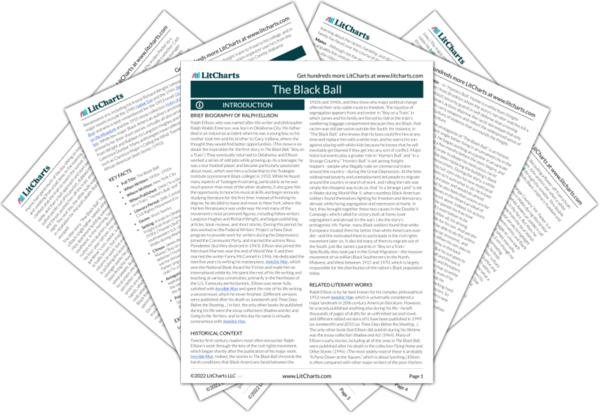“Boy on a Train” and “Hymie’s Bull” are both set primarily on moving trains, which represent a core but elusive American ideal: the promise that migration can bring freedom and a better life. Both stories’ protagonists use trains to try and escape difficult life situations—albeit in very different ways. In “Boy on a Train,” Mama, James, and Lewis leave Oklahoma City after Daddy’s death, because Mama has been promised work in the rural town of McAlester. Even though they are forced to ride in the back of the train with the luggage, the family knows that the trip is their best shot at staying afloat economically. Mama also remembers migrating by train from the South 14 years prior with Daddy, and she is distraught to have to do the same once again, now that the life they built in Oklahoma City has fallen apart. In “Hymie’s Bull,” the narrator explains how he and his brother left home to spend their days hopping freight trains around the U.S. and looking for work. They didn’t find work, so they ended up simply drifting around the country, but at least they are making an effort to improve their lives. Notably, the sensory experience of riding a train elevates the protagonists’ feeling of freedom and progress. In “Boy on a Train,” James and Lewis are fascinated by the rolling hills and farms that they pass, while in “Hymie’s Bull,” the narrator climbs on top of the train to watch the beautiful sunset, which is all the more thrilling because he is barreling precariously towards it at high speed. Like a train chasing the sunset, Ellison’s protagonists don’t necessarily find what they are looking for on their journeys, but these train journeys still represent their fundamental drive to seek a better life through migration.
Trains Quotes in The Black Ball
“See, Lewis, Jack Frost made the pretty leaves. Jack Frost paints the leaves all the pretty colors. See, Lewis: brown, and purple, and orange, and yellow.”
The countryside was bright gold with Indian summer. Way across a field, a boy was leading a cow by a rope and a dog was barking at the cow’s feet. It was a nice dog, the boy on the train thought, a collie.
There were many advertising signs in the fields they were rolling past. All the signs told about the same things for sale. One sign showed a big red bull and read BULL DURHAM.
“Moo-oo,” the baby said.
We were just drifting; going no place in particular, having long ago given up hopes of finding jobs. We were just knocking around the country. Just drifting, ten black boys on an L & N freight.
I stood there on top listening, bent slightly forward to keep my balance like a guy skiing, and thought of my mother, I had left her two months before, not even knowing that I would ever hop freights. Poor Mama, she had tried hard to keep my brother and me at home, but she fed us too long alone, and we were getting much too grown-up to let her do it any longer, so we left home looking for jobs.
Hymie pulled the knife around from ear to ear in the bull’s throat; then he stabbed him and pushed him off the top of the car. The bull paused a second in the air like a kid diving off a trestle into a river, then hit the cinders below. Something was warm on my face, and I found that some of the bull’s blood had blown back like spray when a freight stops to take on water from a tank.
The next day about dusk we were pulling into the yards at Montgomery, Alabama, miles down the line, and got the scare of our lives. […] All at once we heard someone hollering, and when we ran up to the front of the freight, there were two bulls, a long one and a short one, fanning heads with their gun barrels. They were making everybody line up so they could see us better. The sky was cloudy and very black. We knew Hymie’s bull had been found and some black boy had to go. But luck must've been with us this time […] we broke and ran between some cars on around to try to catch the freight pulling out at the other end of the yards. We made it.












